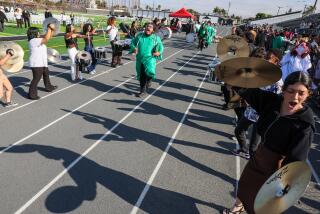Composer, Teacher : Maestro Gone but His Life’s Music Lingers
The latest lesson is still resting on the music stand, as if his next student were just about to arrive.
But after 46 years and thousands of pupils, the sounds of sawing violins and blasting trumpets have finally stopped pouring from Ervin H. Kleffman’s Alhambra music studio.
The tireless music instructor and marching-band composer, who continued to teach until last February, has died at 95.
“He’s just been ‘music’ ever since we were married,” said his wife, Alfreda, 90, whom Kleffman married in 1917. “That was his life.”
A slim, mild-mannered man, Kleffman was something of a legend in the Alhambra School District, where for the last four decades his students have filled out the ranks of the Alhambra, San Gabriel and Mark Keppel high school bands.
Taught by Airmail
The founder of the now-defunct San Gabriel Symphony Orchestra, Kleffman also attracted proteges ranging from the former principal of Mark Keppel Adult School in Alhambra to a bandmaster in Bangkok, Thailand, to whom he gave lessons via airmail.
“If there ever was a ‘music man’ . . . he was,” said Wayne Kelly, 53, chairman of the California State University, Long Beach, journalism department, who three years ago decided to take beginning violin lessons from Kleffman. “He was one of the most patient teachers I think I have ever seen.”
Outside of his inveterate teaching practice, the courtly native of Dorchester, Wis., was known for his marching-band compositions, which have been played by student groups in the Rose Parade and by civic and military bands around the world.
Several years ago, he was commissioned to write “Pride of the Nation” for the Notre Dame University band. His more vintage pieces include “Salute to Peace,” “China Clipper,” “Onward and Upward,” “Mounties on Parade,” “East Meets West,” “Legionnaires on Parade” and “Blaze of Glory.”
But it was through the Kleffman Music Studio--actually a spare bedroom in the couple’s two-story stucco house--that the spry composer earned the affection of so many aspiring musicians.
“He had a lot of boundless energy,” said Bob McCormac, who began lessons with Kleffman 30 years ago and now plays French horn in the Pasadena Symphony. “Things were so intense that by the time you looked up, the lesson had already gone by.”
McCormac’s father, Halstead, who spent more than 30 years teaching music in the Alhambra School District, said that Kleffman was the most popular private instructor for Alhambra students.
“For the elementary- and junior high school-age kids, this guy was the best around here,” said the elder McCormac. “He liked what he was doing and he liked where he was doing it.”
Generous With Time, Money
Known as a gentle but demanding instructor, Kleffman never charged more than $4 for a half-hour lesson and often loaned instruments at no cost to his proteges. His students frequently were delayed an extra hour at the studio until Kleffman was satisfied that they had mastered a particular technique.
“That’s what kept him going,” said his daughter, Jean Stuckey, 69, of Hemet. “I used to tell mom, ‘If he quit now, he wouldn’t be living.’ ”
Kleffman, who grew up in Hibbing, Minn., earned bachelor’s and master’s degrees in music at VanderCook College in Chicago. Later, he taught at the American Conservatory of Music in Chicago and the Chicago Conservatory of Music, where his students included members of the famed John Philip Sousa band.
Book Widely Read
In 1937, he moved to Los Angeles, where he received a doctorate in philosophy from the now-defunct Emerson University. Although out of print, his book, “Music Expression and Interpretation,” enjoys a devoted following.
With more than 8,000 lessons under his belt, it took a broken hip last February to finally slow Kleffman down. After struggling with a heart condition, he died on April 2 at a San Gabriel convalescent home.
“We placed a little violin in his hand in the casket,” Alfreda Kleffman said. “He was ‘music’ all the way around.”
More to Read
The biggest entertainment stories
Get our big stories about Hollywood, film, television, music, arts, culture and more right in your inbox as soon as they publish.
You may occasionally receive promotional content from the Los Angeles Times.










